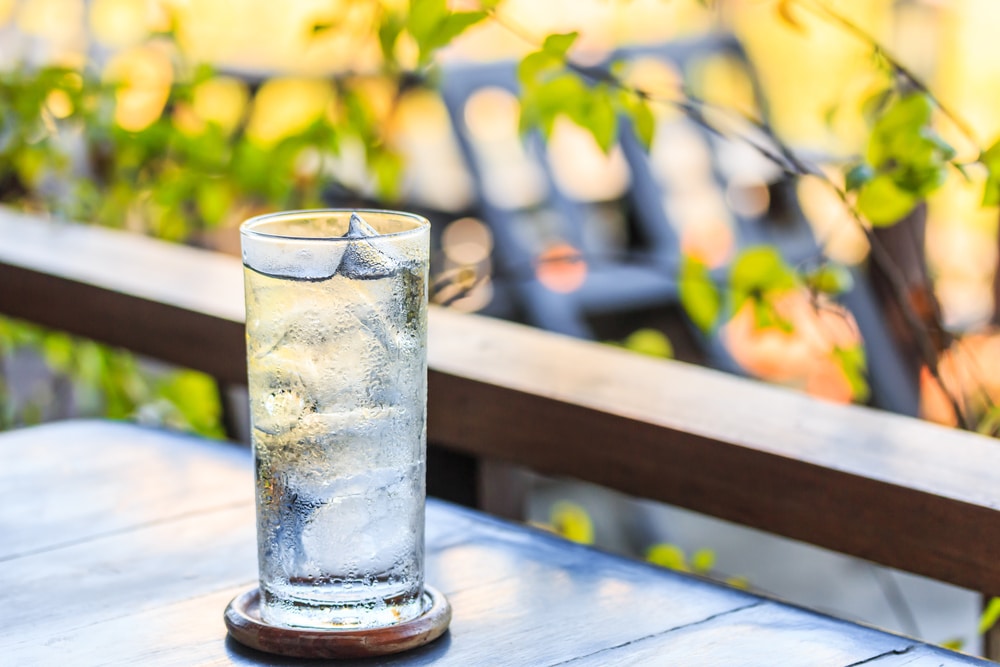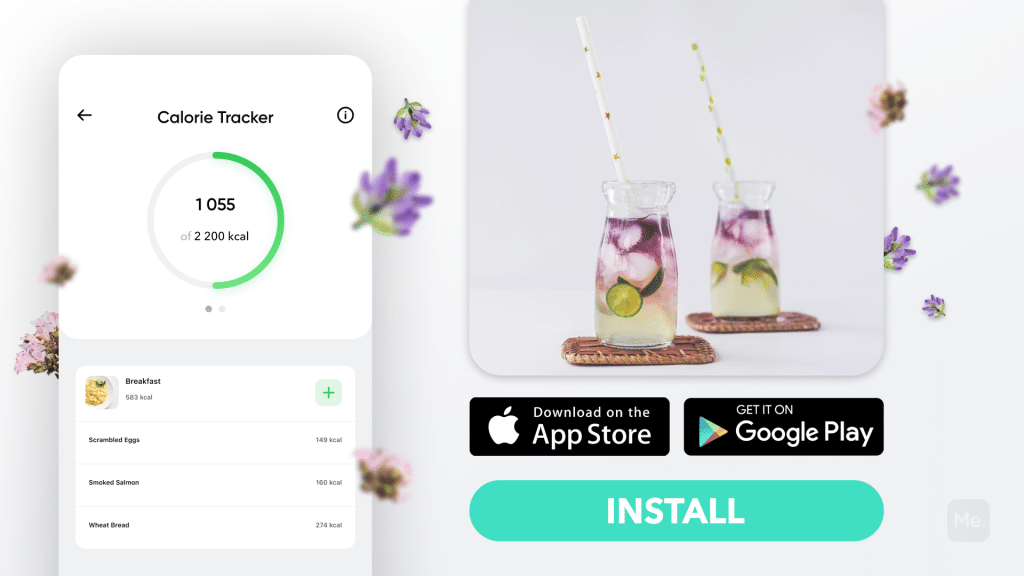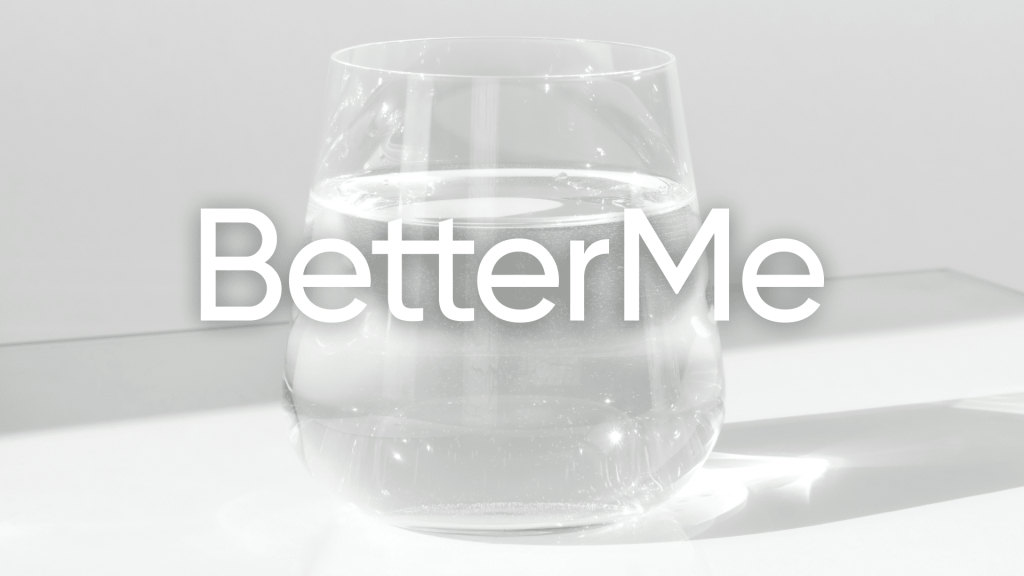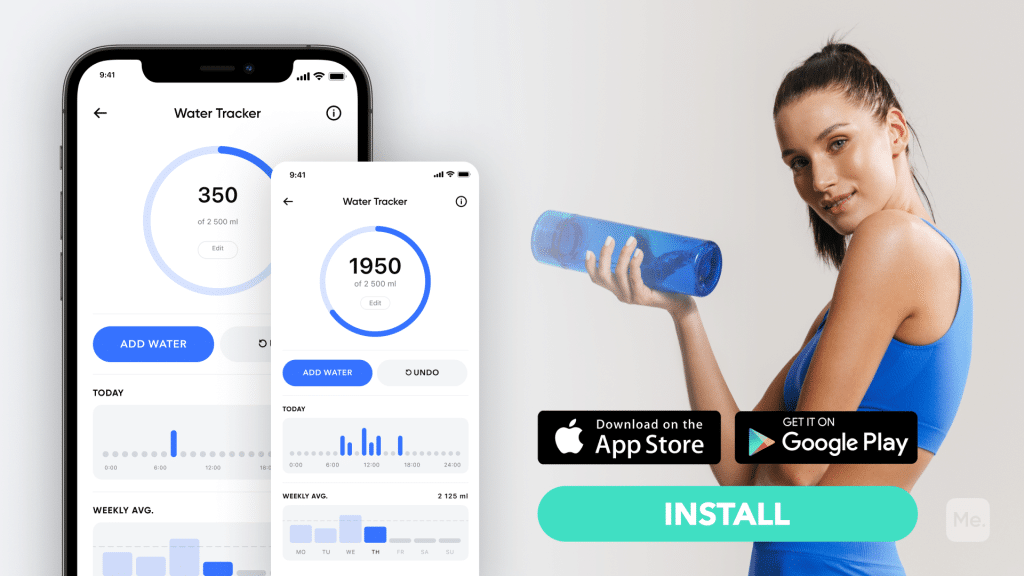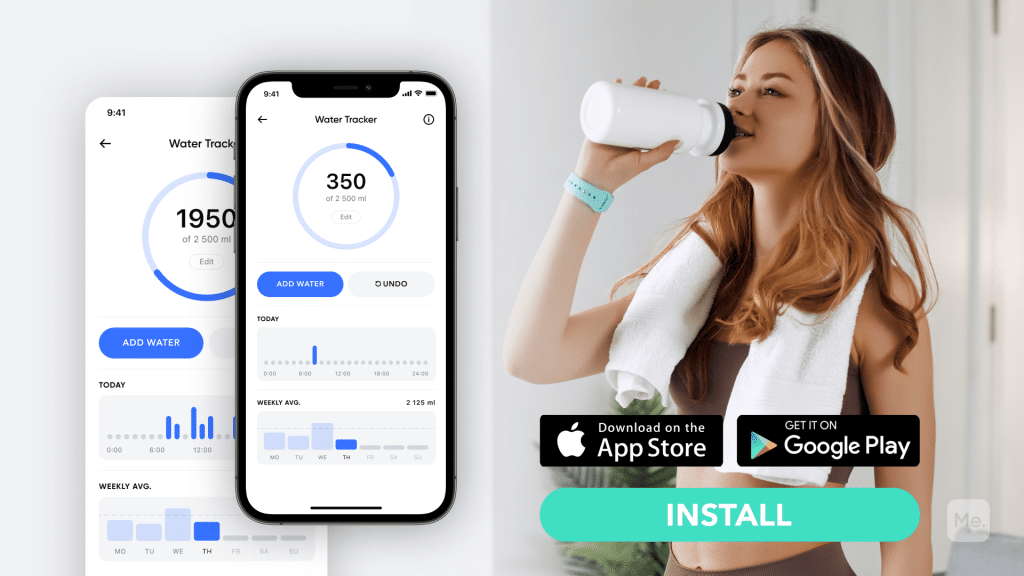Water is water, right? Not quite. If you’ve noticed your skin feeling dry and irritated after showering, or your hair looking dull and lifeless, the water in your home might be to blame. Water hardness is determined by the amount of dissolved minerals, including calcium, magnesium, and limestone, in the water (5). Hard water usually has high levels of these minerals, while soft water typically contains low levels of such minerals. Why does it matter? Well, you might be concerned whether either type is safe to drink, bathe with, or even wash your hair with. Furthermore, you may have genuine plumbing concerns if you live in an area with hard water. Here’s a closer look at the key differences between hard and soft water, as well as the pros and cons of each.
Get your personalized
meal plan!
What Is Hard Water?
Hard water is simply water that contains high levels of dissolved minerals, including calcium, magnesium, and limestone. These minerals are completely safe to drink and bathe with and pose no health risks (6).
In fact, many people actually prefer the taste of hard water because it contains natural minerals like calcium and magnesium that can be beneficial for your health. It has even been suggested that hard water may be linked to a reduced risk of cardiovascular disease (1).
That said, hard water can cause some problems in your home. For instance, it can leave behind mineral deposits, or scale, on your fixtures and plumbing (4). Over time, this scale can build up and cause serious damage to your pipes. Additionally, hard water can make it difficult to get your laundry clean and can even shorten the lifespan of your appliances.
What Is Soft Water?
Soft water, on the other hand, is water that contains low levels of dissolved minerals. Because it doesn’t have high levels of calcium and magnesium, soft water is less likely to leave behind mineral deposits.
Taste-wise, soft water is often described as being “soapy.” This is because it doesn’t contain the natural minerals that give hard water its taste. It contains more sodium than hard water, which is why it can often leave behind a salty residue.
Like hard water, soft water is perfectly safe to drink and bathe with. In fact, some people actually prefer the taste and feel of soft water.
Read More: Mint Water Benefits, Risks, And Recipes
How Can You Tell The Difference Between Hard Water And Soft Water At Home?
You can’t tell by looking whether water is hard or soft. The only way to know for sure is to have it tested. The water hardness scale is used to measure the amount of dissolved minerals in water.
- 0-60 ppm is classified as soft water
- 61-120 ppm is moderately hard water
- 121-180 ppm is hard water
- 181-300+ ppm is very hard water
If you’re not sure how to test your water hardness, you can contact your local water utility company. They should be able to tell you the level of hardness in your water.
That said, there are a few clues that can give you an idea of which type you have.
Signs of hard water include:
- Feeling a film on your skin after showering: this is caused by a chemical reaction between soap and the high levels of calcium and magnesium in hard water.
- Seeing mineral deposits, or scale, on your fixtures: this is caused by the high levels of calcium and magnesium in hard water.
- Experiencing reduced water pressure: this can be caused by scale buildup in your pipes
- Noticing that your dishes aren’t as clean as they used to be: this is because soap doesn’t lather as well in hard water
- Having difficulty getting your laundry clean: hard water can make it difficult for soap to lather, which can make it harder to get clothes clean.
Signs of soft water include:
- Soap lathering easily: this is because soft water contains high levels of sodium, which makes it easier for soap to lather
- Slight salty taste: this is because soft water contains high levels of sodium
- Cleaner clothes with less detergent: this is because soft water doesn’t need as much detergent to get clothes clean
- Good water pressure: this is because soft water doesn’t contribute to scale buildup in pipes
If you’ve mustered up the courage to crush your weight loss goal, let Betterme take the sting out of this demanding process. Our app will help you restructure your habits, remold your life and crank up your fitness results!
Which Is Better, Hard Water Or Soft Water?
There’s no easy answer to this question since there are pros and cons to both hard water and soft water. It really depends on your personal preferences as to which type of water is better for you. Usually, you don’t have a choice – the water in your area is either hard or soft.
For Drinking
When shopping for drinking water, you’ve noticed labels written “mineral water” or “spring water.” Such water has gone through a filtration process to remove impurities, but they still contain high levels of minerals.
Minerals are actually good for you and provide many health benefits. For example, calcium and magnesium can help strengthen bones and teeth (6). Hard water typically contains more minerals than soft water, making it a healthy choice for drinking.
Taste-wise, many prefer the taste of hard water over soft water. Soft water has a “flat” taste because it lacks minerals, while hard water has a slightly metallic taste because of the high mineral content.
You may be concerned about the high sodium content in soft water if you are trying to limit your sodium intake, but it isn’t enough to make a major difference. Focus instead on limiting processed foods and the salt you add to your food (3).
If you have hard water, you may want to invest in a home filtration system to remove impurities.
For Laundry And General Cleaning
Hard water is tough on clothing and can cause fabrics to wear out more quickly. The high mineral content in hard water can also lead to spots and streaks on dishes, glasses, and silverware.
Soft water, on the other hand, is much gentler on clothing and doesn’t leave spots or streaks. It might help you save on water bills since you can use less detergent with soft water.
If you have hard water, you may want to use a water softener to make it easier on your clothing and dishes. A water softener removes minerals from the water, making it softer.
For Bathing
Hard water can contribute to dry skin and hair. The high mineral content can leave your skin feeling tight and your hair looking dull. These minerals can also change the pH balance of your skin, weakening its barrier and making it more susceptible to irritation. People with eczema may find that their symptoms worsen when they shower with hard water (7).
Soft water, on the other hand, is much gentler on skin and won’t strip away its natural oils. This can help to keep your skin looking hydrated and healthy.
If you notice problems with your skin and hair after switching to hard water, you may want to invest in a shower head filter. A shower head filter will remove minerals from the water, making it softer and less likely to cause dryness and irritation.
Read More: Benefits Of Hydrogen Water: Should You Believe The Hype?
Is Tap Water Hard Or Soft?
The source of tap water (groundwater or surface water) and the treatment it undergoes will determine its hardness. In general, groundwater is harder than surface water because it has been in contact with rock for a longer time, allowing minerals to leach into it.
Water that has undergone reverse osmosis or distillation is considered soft, while water that has undergone ion exchange is considered hard.Your local water authority can tell you the hardness of your tap water.
Does Your Home Need A Water Softening System?
A home water-softening system works by exchanging the minerals in hard water (calcium and magnesium) for sodium. This process is known as ion exchange.
There are two types of water-softening systems: salt-based and salt-free:
Salt-Based Systems
These work by exchanging the calcium and magnesium ions in hard water for sodium ions. These systems need to be regularly replenished with salt, and they can add sodium to your water.
Reasons why BetterMe is a safe bet: a wide range of calorie-blasting workouts, finger-licking recipes, 24/7 support, challenges that’ll keep you on your best game, and that just scratches the surface! Start using our app and watch the magic happen.
Salt-Free Systems
These work by a process called chelation. This process binds the calcium and magnesium ions together so that they can’t attach to surfaces. While these systems don’t add sodium to your water, they may not be as effective at removing hard minerals.
You may need a water-softening system if you have hard water. Hard water can cause spots and streaks on dishes, glasses, and silverware. It can also contribute to dry skin and hair. If you notice these problems, you may want to consider investing in a water-softening system.
There are two precautions you should take if you have a water-softening system. First, make sure you regularly maintain your system to prevent it from becoming a breeding ground for bacteria. Second, if you’re on a low-sodium diet, you may want to use distilled or reverse-osmosis water to avoid consuming any extra sodium, but don’t worry too much about this – the sodium added by water softening systems isn’t that much.
Final Thoughts
Hard water and soft water have their own unique set of benefits and drawbacks. It’s really up to you to decide which type of water is best for you. If you’re not sure, you can always have your water tested to see what kind of water you have.
DISCLAIMER:
This article is intended for general informational purposes only and does not serve to address individual circumstances. It is not a substitute for professional advice or help and should not be relied on for making any kind of decision-making. Any action taken as a direct or indirect result of the information in this article is entirely at your own risk and is your sole responsibility.
BetterMe, its content staff, and its medical advisors accept no responsibility for inaccuracies, errors, misstatements, inconsistencies, or omissions and specifically disclaim any liability, loss or risk, personal, professional or otherwise, which may be incurred as a consequence, directly or indirectly, of the use and/or application of any content.
You should always seek the advice of your physician or other qualified health provider with any questions you may have regarding a medical condition or your specific situation. Never disregard professional medical advice or delay seeking it because of BetterMe content. If you suspect or think you may have a medical emergency, call your doctor.
SOURCES:
- Cardiovascular Health: Hard Data for Hard Water (2008, nih.gov)
- Calcium, Nutrition, and Bone Health (n.d., aaos.org)
- How does salt affect blood pressure? (2021, cdc.gov)
- How Hard Water Can Affect Your Plumbing System (2018, coastaldrains.co.uk)
- Hardness of Water (n.d., usgs.gov)
- Potential Health Impacts of Hard Water (2013, nih.gov)
- The Effect of Water Hardness on Surfactant Deposition after Washing and Subsequent Skin Irritation in Atopic Dermatitis Patients and Healthy Control Subjects (2017, jidonline.org)
